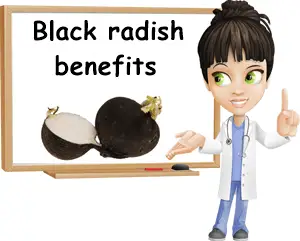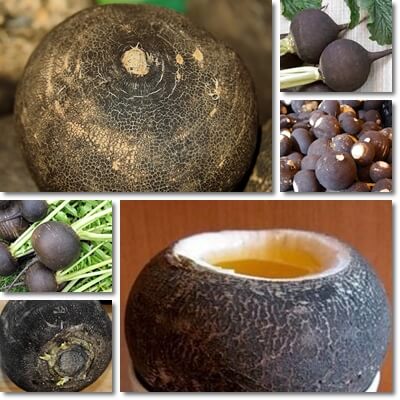Black radish is a winter radish variety with dull brown-black or black skin and striking white flesh. A popular folk remedy for sore throat and coughing, black radish is now a recognized nutraceutical with scientifically proven antioxidant, anti-inflammatory and anticancer properties. Black radish and black radish juice have a hepatoprotective action, contribute to preventing cholesterol gallstones and exert detoxifying effects.
What is black radish?
Black radishes are a cultivated variety of fall and winter radish with brown-black or black skin. The scientific name is: Raphanus sativus niger. The variety grows significantly bigger compared to the more common pink spring radish, and has a tougher skin and firmer flesh. The black radish is an ‘old radish’ variety, once popular in the Balkans and other regions of Europe, but also Africa, parts of Asia and Mexico. Resurging from near oblivion, the black radish is now a valued functional food with scientifically recognized therapeutic benefits. A popular variety is the Spanish black radish which produces near perfect round roots.

What does black radish look like?
Black radishes are a dark-colored variety of winter radish with a tough, dull brown-black or jet black skin and completely white, crisp, glossy flesh. The dark-colored root, which is the radish itself, grows underground and forms long green stems with light, then dark green leaves aboveground. There are two main varieties of black radish: a round variety and an elongated variety. At first glance, the round variety looks more like a beetroot than a classic radish, while the elongated variety looks more like a tuberous root such as a black potato.
Why do some radishes turn black?
Radishes are commonly pink, red, purple or white (the famous daikon radish). But some radishes turn black. Why? Black radishes develop dark pigmented anthocyanin antioxidants in their skin, hence their color. Anthocyanins are responsible for red, purple, blue and black colors in many foods and plants in general, and are what makes black radishes black.
Can you eat black radish raw?
You can eat black radish raw, cooked, pickled or any way you want to. Black radish is edible in its entirety which means you can eat the root, flesh and skin, and green tops, aka the radish leaves. Black radish is best eaten whole and raw – the raw root still has all of its vitamin C, and by eating the skin along with the flesh you get pigmented anthocyanin antioxidants with scientifically-proven anticancer properties. Because the skin is quite tough, it is a good idea to either finely slice the radishes or cut them in thin strips.
What does black radish taste like?
Black radish should taste sharp and spicy, with delicate earthy flavor notes. The flesh should be crispy and juicy and, depending on the age of the root at harvest time, firm, but tender to somewhat tough. As a general rule, the younger, more immature radishes are more tender, while the older, mature radishes are tougher. Black radishes have a tougher skin, woody almost, and they are generally bigger than pink spring radishes.

Black radish nutrition
Black radishes are a modestly nutritious food, with a nutritional value in line with the nutrition of the more common pink and red radishes, with a few exceptions. Black radishes are a good source of vitamin C (15-20% of daily recommended intake of vitamin C per 100 g), vitamins B6, B9 and potassium. The variety contains small amounts of most essential vitamins and dietary minerals, including vitamins B1, B2, B3, B5, calcium, iron, magnesium, manganese, phosphorus and zinc.
Black radish is a high-water, low-carb, very low-sugar and very low-fat food, and has around 2 g of dietary fiber per 100 g of root with flesh and skin. Black radishes are high in dark-pigmented anthocyanin antioxidants and a source of isothiocyanates and other bioactive Brassicaceae chemicals with scientifically proven anticancer properties.
Black radish benefits and uses
Natural remedy for sore throat and cough
Black radish with raw honey is a popular and effective folk remedy for throat soreness and cough. Wash a black radish well and tap dry with a paper towel. Cut open the top part and scoop out some of the flesh, then add 1 tablespoon of raw honey and let sit. The radish will ooze a juice full of biologically active glucosinolates, vitamin C and other phytochemicals with antioxidant, antibacterial and anti-inflammatory properties, while the honey will improve the taste and exert a soothing and reparative action.
Once the radish fills with juice, drink it, making sure to not drink or eat anything 30 minutes to an hour afterwards to allow the black radish juice and honey to reduce inflammation and soreness and relieve coughing. You can repeat the process several times until there is no juice oozing out of the radish, then eat it. Choose your favorite honey on the honey page.
Detoxifying properties
Glucosinolates in black radish have been found to exert an anti-toxicity action and enhance detoxification. In a study, mice fed a 20% Spanish black radish diet for 2 weeks had greater expression of detoxification enzymes, faster metabolism of DMBA, with a reduction in DMBA-induced bone marrow toxicity (source), confirming the detoxification properties of black radish.
Anti-inflammatory food
In a study, black radish was shown to combat inflammation and associated microscopic anatomical changes to the colon lining of rats fed a high fat diet (source). Black radish root is also a good source of vitamin C which is a known antioxidant and immunomodulatory agent with free radical-scavenging and anti-inflammatory effects. Research also shows isothiocyanates reduce activation of carcinogens and increase their detoxification (source), exerting an anti-tumor activity.
Benefits for liver health
Eating black radish, drinking black radish juice or taking black radish supplements is good for liver health, limiting and actively combating liver damage via bioactive sulfur compounds such as glucosinolates and their metabolites, isothiocyanates. Research shows black radish extract has a hepatoprotective action and can lower the risk of nonalcoholic fatty liver disease (source).
Prevents cholesterol gallstones
Studies show glucosinolates and their metabolites, isothiocyanates, occurring naturally in black radish lower blood cholesterol and hepatic cholesterol levels which can help prevent the formation of cholesterol gallstones (source), contributing to gallbladder and digestive health. Also see the benefits of artichoke for high cholesterol.
Anticancer food
Black radishes are a source of biologically active anticancer agents such as glucosinolates, their metabolites, isothiocyanates, and anthocyanins. Glucosinolates from Black radish and their metabolites, isothiocyanates, have demonstrated the ability to induce detoxification in a hepatoma cell line, a type of malignant human liver cancer (source). Isothiocyanates, the metabolites of glucosinolates, have also demonstrated anticancer activity against a number of other cancers such as leukemia, colon and breast cancer. According to research, black radishes and Spanish black radishes in particular contain 4 times more glucosinolates than other crucifers.
In vitro and in vivo animal studies show pigmented anthocyanin antioxidants such as those found in the skin of black radishes exert multi-level anticancer properties including antioxidant, anti-inflammatory, detoxifying, anti-proliferative, mutagenesis-inhibiting, apoptotic and anti-angiogenesis activities. Anthocyanins have demonstrated some degree of anticancer activity against esophageal, skin, lung, colon and breast cancers (source).
Good for weight loss
Black radishes are low-calorie (20-30 kilocalories/100 g), low-carb and very low-fat which makes them a good food to eat if you are looking to lose weight. Because they provide most essential vitamins and minerals and are a source of important antioxidants, they contribute to healthy weight loss.
Black radish side effects
The black radish is generally considered a safe food to eat and can be incorporated in many diets as a culinary vegetable or functional food. Side effects are possible, as with any food, but unlikely and rare if black radish is consumed in normal food amounts.
